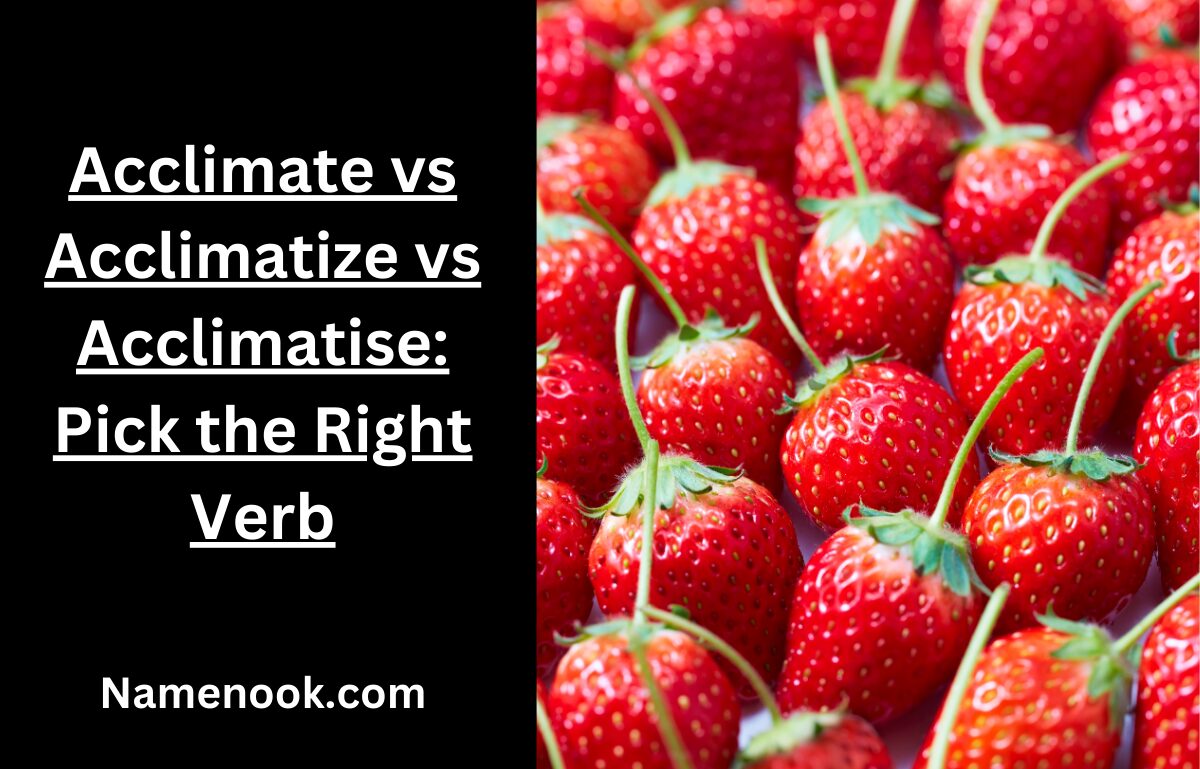When exploring the nuances of the English language, you may come across the verbs acclimate, acclimatize, and acclimatise. Though they appear similar, understanding their differences can help you use them correctly. This article will explain each term, offer examples, and clarify when to use each verb. Let’s dive into this linguistic journey!
What do “Acclimate”, “Acclimatize”, and “Acclimatise” Mean?
Here’s a quick breakdown of each verb:
- Acclimate: This verb means adjusting to a new climate, environment, or situation. For example, you might acclimate to a hotter climate after moving to a warm state.
- Acclimatize: This has the same meaning as acclimate, but it’s often used in scientific contexts, particularly when referring to biological or physiological adjustments. For example, athletes may need to acclimatize to high altitudes.
- Acclimatise: This is the British English version of acclimatize. The meaning is the same, but the spelling follows British conventions.
Now that we know what each verb means, let’s break them down further.
Acclimate
Acclimate usually refers to the process of becoming familiar with a new environment or set of conditions. Here’s an example:
Scenario Example: Imagine a person moving from a cold northern state to the warm beaches of Florida. At first, they might feel uncomfortable due to the heat and humidity. Over time, they acclimate by adapting their routine, perhaps wearing lighter clothing and spending more time outside.
In this case, the person is actively adjusting to their new surroundings, which is the essence of acclimating.
Acclimatize
Acclimatize is often used in more technical or scientific contexts, especially when referring to physiological or environmental adjustments. It’s common in fields like physiology or environmental science.
Scenario Example: A group of mountaineers preparing to climb a high peak may spend several days at base camp to acclimatize to the lower oxygen levels. This helps their bodies adjust to the conditions and reduce the risk of altitude sickness.
Here, acclimatizing involves biological changes in response to environmental pressures.
Acclimatise
For those who use British English, acclimatise serves the same function as acclimatize. The meaning remains the same, but the spelling follows British conventions.
Scenario Example: A student studying abroad in the UK might need to acclimatise to local customs and weather. Initially overwhelmed by the drizzle and cultural differences, they gradually adjust, learning to navigate public transport and enjoy local dishes.
In this case, the student is actively engaging in the process of acclimatising to their new environment.
Acclimate vs Acclimatize vs Acclimatise: What’s the Difference?
Let’s break down the differences between these verbs:
- Acclimate: Used in everyday language, emphasizing personal or experiential adjustment.
- Acclimatize: More formal or scientific, focusing on physiological adaptation.
- Acclimatise: The British variant of acclimatize, used in the same contexts.
Here’s a simple table to summarize:
| Verb | Usage | Context |
|---|---|---|
| Acclimate | Everyday adjustment | Personal experiences |
| Acclimatize | Scientific/technical contexts | Physiological or environmental |
| Acclimatise | British English variant | Same as acclimatize |
Origins of These Verbs
The origins of these verbs provide insight into their meanings and usage:
- Acclimate: Derived from the Latin roots ad- (meaning “to”) and clima (meaning “climate”), reflecting the idea of adapting to a specific climate.
By understanding these subtle distinctions, you can use acclimate, acclimatize, and acclimatise accurately in different contexts.
Acclimatize
The verb acclimatize comes from the same Latin roots as acclimate, but it includes the suffix “-ize,” which indicates an action or process. This gives acclimatize a slightly more formal tone, making it well-suited for scientific or technical discussions.
Acclimatise
In British English, the verb acclimatise follows the same etymological roots as acclimatize but adheres to British spelling conventions.
Simple Tense Table for These Verbs
Knowing how to conjugate these verbs is important for using them correctly. Here’s a quick reference table for the present, past, and future tenses:
| Verb | Present Tense | Past Tense | Future Tense |
|---|---|---|---|
| Acclimate | acclimates | acclimated | will acclimate |
| Acclimatize | acclimatizes | acclimatized | will acclimatize |
| Acclimatise | acclimatises | acclimatised | will acclimatise |
Examples in Context
To help you understand how these verbs are used, here are some real-life examples:
Example 1: Acclimate When I traveled to Japan for the first time, I had to acclimate to local customs, like bowing instead of shaking hands. Initially, I felt awkward, but over time, I adjusted and even came to enjoy the practice.
Example 2: Acclimatize Athletes often need to acclimatize to different conditions. For example, runners competing in hot weather must change their training schedules to avoid overheating.
Example 3: Acclimatise After moving to London, I had to acclimatise to the public transport system. At first, I found it confusing, but after some time and practice, I learned to navigate the underground like a pro.
Synonyms
Sometimes, using synonyms can help add variety to your writing. Here are some alternatives for each verb:
- Acclimate: adjust, adapt, conform, familiarize
- Acclimatize: adjust biologically, adapt, accommodate
- Acclimatise: adjust, adapt (British usage)
While synonyms can enrich your writing, it’s important to choose the one that best fits the context of your sentence.
A Final Look at Acclimate vs Acclimatize vs Acclimatise
In conclusion, understanding the differences between acclimate, acclimatize, and acclimatise can greatly improve your writing and communication. While all three words mean adjusting to new environments, the specific contexts in which they are used can vary.
Whether you’re writing casually or discussing scientific concepts, knowing when to use each verb will help you express your ideas clearly and accurately.
Next time you come across these verbs, keep in mind the examples we’ve discussed. Choosing the right term not only improves your clarity but also enhances your language skills.


2 thoughts on “Top 5 Best Acclimate vs Acclimatize vs Acclimatise: Pick the Right Verb”